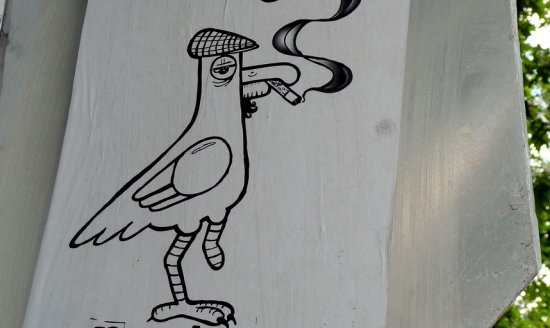Cigarette Butts Help Bird Nests Repel Parasites
 No one likes seeing cigarette butts strewn about city streets. No one, that is, except maybe urban birds. New research shows bird nests that incorporated cigarette butts may be repelling unwanted parasites. It turns out the deadly chemicals contained in cigarettes may provide a useful service for birds. Based on known bird behaviors, it’s also possible that birds are seeking out cigarette butts to put in their nests to repel pests.
No one likes seeing cigarette butts strewn about city streets. No one, that is, except maybe urban birds. New research shows bird nests that incorporated cigarette butts may be repelling unwanted parasites. It turns out the deadly chemicals contained in cigarettes may provide a useful service for birds. Based on known bird behaviors, it’s also possible that birds are seeking out cigarette butts to put in their nests to repel pests.
In a new paper titled Incorporation of cigarette butts into nests reduce nest ectoparasite load in urban birds: new ingredients for an old recipe?, researchers from the University of Mexico published the results of a study on the effect of the presence of smoked cigarette butts in the nests of urban birds. They found that the number of parasites in a nest was impacted as a negative function in relation to the amount of cellulose from used cigarette butts present in the nest. Basically, the more used cigarette material found in the nest, the fewer parasites there were.
To test that the cigarette butt material was repelling the parasites, the researches set up two heat traps to capture the parasites. One trap had cellulose from smoked cigarettes, and the other had material from non-smoked cigarettes. The non-smoked cigarettes would have far fewer chemicals because the cellulose of the filter had not processed any smoke. The traps with the non-smoked cigarettes consistently trapped more parasites, meaning parasites were less attracted to the chemical-laden smoked cigarettes.
Some species of birds have used materials such as fragrant plants in a process known as self-medication that is either meant to repel parasites or boost the immune systems of the birds in the nest. The nicotine and other chemicals left behind in the cellulose of the discarded cigarette butts probably have a better chance at repelling insects than increasing anyone’s immune system. Nicotine is a known antiherbivore chemical, and the birds could be seeking out used cigarette butts to use for that purpose.
This is a great example of a species making use of something from human society, but please don’t take it as an excuse to leave your filthy cigarette butts on the street. Please.
(via Biology Letters, image via liquidnight)
- Squirrels are teaching robots to lie
- The Arizona desert is full of garbage
- Humans scare elk more than their predators do
Have a tip we should know? [email protected]